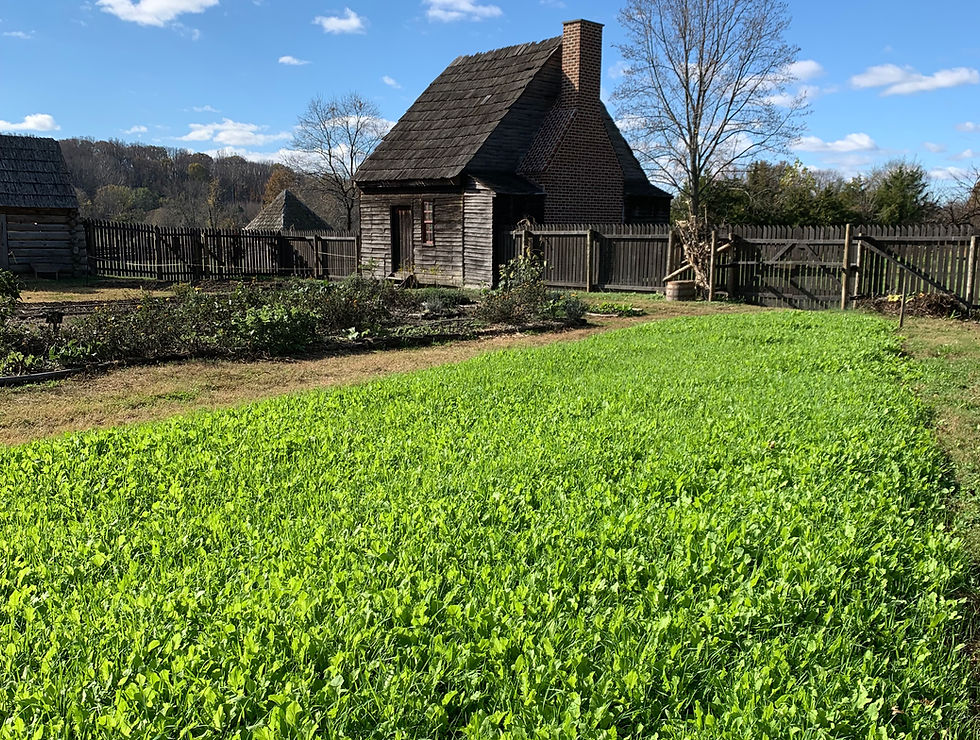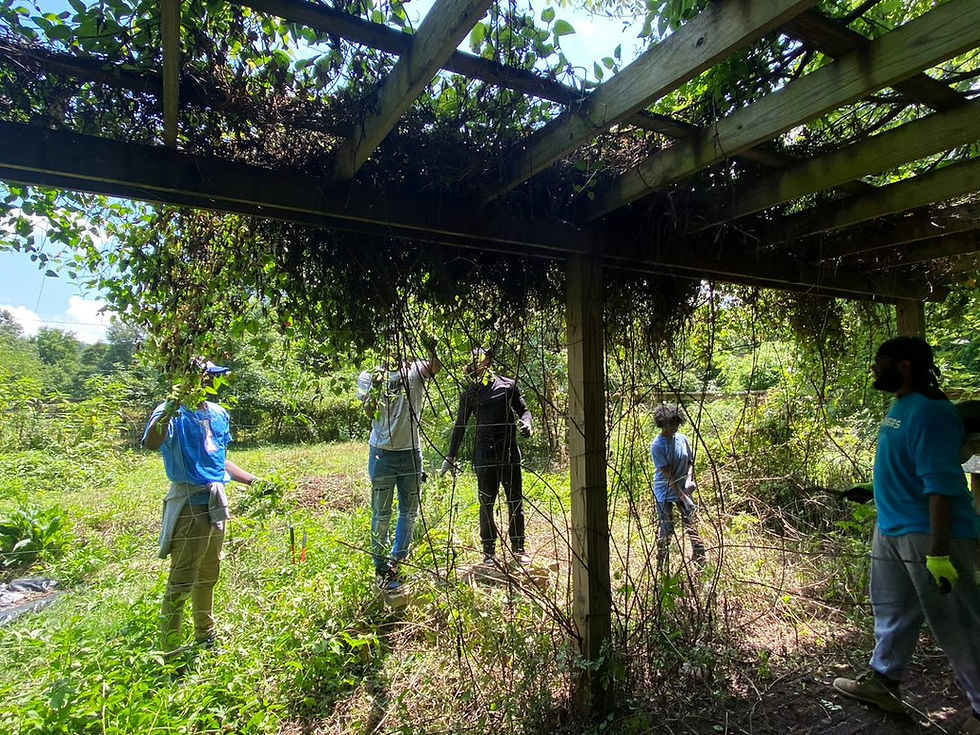Field Notes: Volume 16, Number 19
- Accokeek Foundation

- Sep 16, 2011
- 4 min read

This Week’s Harvest
Beans (Dragon Tongue)
Scallions
Garlic
Onions
Cilantro
Tomatoes
Potatoes
Squash (Delicata)
As the fields begin to slowly dry out, I look back on the 15 inches of rain we received over the course of 12 days and remember when Colette and I were farming back in Minnesota. In August of 2007, we received 15 inches of rain in six hours. How different the soils and how different the outcome. The flood of 2007 that ravaged parts of southeastern Minnesota, southwestern Wisconsin, and northeastern Iowa dumped a total of 17 inches on our one-and-a-quarter acre garden over the course of 24 hours.
While farming in my hometown of Rochester, Minnesota, I also worked at a restaurant in the evenings, and I remember going into work that afternoon with the rain starting to come down. Never did I anticipate what lay ahead as the day progressed. The restaurant sat on a corner with expansive windows that allowed me to look into the soul of the storm. At times, the rains came so hard I could barely see across the street. When the downpour failed to cease, I nervously rang Colette to see how things were faring at the farm. I was disheartened to hear of the topsoil running off the surrounding soybean fields and heading toward the culverts under the road. Our garden, though, seemed to be doing much better. So I carried on at work as the rains continued. I was relieved to get home at the end of the night to face the damages head on. Thanks to rather sandy soils and pathways covered in firmly rooted white clover, our garden escaped relatively unscathed. Others were not so lucky. Better not to imagine what 17 inches of rain would do to the Ecosystem Farm in 24 hours. Instead, I will face the reality of receiving 15 inches over the course of nearly two weeks.
The Brussels sprouts have suffered heavily; nearly half have so far succumbed to the wet. The turnips and peppers in the field have been wiped out and the tomato vines are nearly dried up. The broccoli, cauliflower, and cabbages have taken some hits as well, and many are fighting to hang on. The peas, beets, and leeks are holding their own, along with the rutabagas. On a brighter note, the fennel, planted just a few beds away from the turnips, is thriving and seems to be taking off with the cooler nights of late. We have managed to get some more lettuce and arugula planted in what drier ground we have. We put some late carrots in the high tunnel and hope to finish planting the tunnels over the next week. Some lettuce, mizuna, fennel, and scallions are all that remain to be planted and much of that should go in the ground soon, barring we don’t get too much more rain.
The winter squash harvest is underway as the plants quickly gave way to the pressures of the rain. While not as many had time to ripen as we had hoped, those that were close may hopefully continue to ripen over the ensuing days as we lay them out to cure in the small hoop house. Be sure to look for the little delicatas that will be gracing your boxes this week. Perhaps when the cooler weather sets in, the idea of turning on the oven to bake squash won’t seem quite so absurd!
Take care and have a wonderful week,
Courtney Buchholtz & Your Farmers
Save the Date: SHAREholder Potluck
Save the date! The Ecosystem Farm will be hosting a fall potluck for our SHAREholders and their families on Saturday, October 1, from 11 a.m. to 2 p.m. Please bring a dish to share, utensils to use (including plates, cups, and silverware), and a blanket or chair to sit on. The potluck will take place on the Ecosystem Farm; in the case of inclement weather, we will move indoors to the Education Center. Please RSVP by emailing Courtney Buchholtz at courtneybuchholtz@accokeek.org no later than Wednesday, September 28. A sign-up sheet will also be available in the packing shed.
Below, photos from this week on the Ecosystem Farm. Click images to enlarge, or view them on Flickr.
This Week’s Recipe: Baked Delicata Squash with Lime Butter
Ingredients:
2 delicata squash, halved and seeded
3 tablespoons butter, softened
1 tablespoon fresh lime juice
1 teaspoon chili powder, or to taste
1/2 teaspoon lime zest (optional)
kosher salt and ground black pepper to taste
Directions:
Preheat oven to 350 degrees F. Place the squash cut side down into a baking dish. Pour water into the dish about 1/4 inch deep. Bake squash in preheated oven until it pierces easily with a fork, about 30 minutes.
Meanwhile, blend the butter with the lime juice and chili powder in a small bowl. Mix in the lime zest, if desired. Season to taste with salt and pepper. Spoon the butter mixture into the cooked squash, and serve immediately.
Upcoming Events
Monthly Foodways: Saturday, September 17, 2011, 12 p.m. to 1 p.m., National Colonial Farm: Join us for a kitchen table conversation as we introduce you to the epicurean delights of colonial Marylanders. Learn how our tastes and the food itself have changed over 300 years as we explore the “receipts” (recipes) and meal preparation for everything from peas and pottage to food traditions for which Maryland is known. This month’s menu will include asparagus forced in a french role, a forced cabbage, and beef royal.
Presentation: The Invention of Slavery in the Chesapeake: Tuesday, September 20, 2011, 6:30 to 8 p.m., Education Center: Although the practice of slavery has existed for millennia, the particular form it took in the New World was unprecedented and unique. It has indeed been widely acknowledged as our “peculiar institution.” In this illustrated lecture, we will discuss how the dominant tobacco culture of the Chesapeake region created a slave society, affecting all people, both free and enslaved, and every aspect of social and economic life. This presentation will be given by Josephine Withers, an educator for the Accokeek Foundation and a professor emerita of the University of Maryland.
It’s one thing to purchase produce that’s in season, and quite another to cook it. Sustainable Table is a monthly cooking course that demonstrates how to use in-season fruits, vegetables, and herbs to create healthful, wholesome, and delicious meals. Each class will spotlight one well-loved fruit or vegetable standard and one unusual item. Participants will receive printed recipes to take home.







